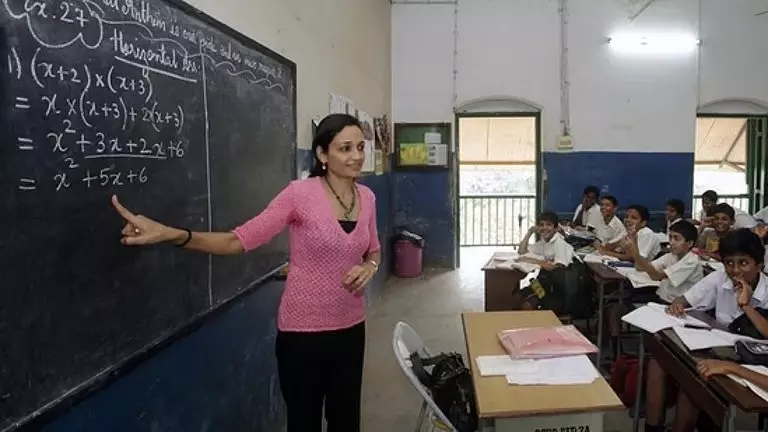Devi Kar | How Teaching has Changed over the Years: Much that is Good in Old & New
Teachers, and our expectations from them, have changed drastically, especially in the last decade, with the mushrooming of schools following international curricula

I have been a school educator for 55 years and have earned the right to comment on how school teachers have changed over the decades in my city, Kolkata. Writing this article will be a good exercise as I have to reflect on the relative qualities of the old and the new and discourage me from yearning for the “good old days”. We can’t really grumble about everything that is new nor claim that the past was “golden” in every way.
When I began my career, the teaching staff seemed a happy-go-lucky lot who just went about teaching their pupils what they knew themselves. We were certainly not well-versed in different pedagogical methods and strategies but read widely and tried to implement what we had learnt in our B.Ed. programme. We had a lesson plan, long-term and immediate goals and an interesting set of questions. I don’t remember students asking too many questions, but they clearly enjoyed the lessons conducted with a generous dose of humour. Our students adored most of us and even as modern, well-informed mothers who are keenly invested in their children’s education, they still rave about their old teachers.
Teaching methods comprised storytelling, anecdotal references, discussion, group activities and team games. Teaching aids included pictures, large maps, lab equipment, scales, weights and counters. Field visits and practical work were given due importance even then. Every student was provided a grounding in art and craft, needlework, music/singing, domestic science and physical education, and everyone had to study mathematics and science, apart from the social sciences, literature and an Indian language at least till the secondary level.
My teaching career began by chance, not by choice. I was still pursuing my post-graduate studies but the Calcutta University MA exams were kept on hold for some reason. Meanwhile, my school principal called me to fill in for a Bengali teacher who was taking leave for her B.Ed. examination in Bhubaneswar. It was a given that I would accept the temporary teaching assignment as nobody said “no” to one’s teacher in those days. Bengali was certainly not my strongest subject, but it was not too bad either. Armed with my limited knowledge and skills, I ventured into the teaching world. Within a couple of months, I was offered a permanent teaching position in January1969 and I accepted the offer for the princely monthly salary of Rs 300. I have happily remained in the teaching profession since.
Regarding the employment of teachers, it appeared there was a general lack of structure and professionalism. Training was not mandatory, but over the years it became a requirement. Any personable individual with college qualifications fitted the bill provided she was a good communicator. Highly qualified candidates for the primary department were often rejected for being “overqualified”. I am not sure this practice has changed much. There is a belief that people who have pursued higher studies are incapable of “coming down” to the level of primary children. My experience has shown you must have fine minds, a love (and understanding) of children along with appropriate training in methodology to make a good primary teacher. Far from impacting their mind negatively, higher studies will enrich it. Our youngest minds need the best teachers.
Teachers, and our expectations from them, have changed drastically, especially in the last decade, with the mushrooming of schools following international curricula.
Sometimes today’s teachers appear a different breed altogether. They exude corporate professionalism and seem to be products of a commercialised education system where lucrative careers are the ultimate goals. But these “new age” teachers are simply superb in their profession. Their subject knowledge is unquestionable and they have mastered the art of conducting demo lessons. They show off their familiarity with technology, their techniques of asking and eliciting questions and are able to create a tremendous first impression.
The teachers who have received training from different international boards speak in an esoteric language full of jargon. Now I too have become well-versed in these commonly used expressions. Just listening to their conversations is an eye opener for those unfamiliar with contemporary learning strategies.
The evaluation process is clear and precise and each subject has its own assessment criteria, defining expectations at different levels. What I appreciate most is that the system is based on the meeting of standards and acquisition of skills and learning, not on outperforming other students. You overhear teachers peppering their talk with ATL, CRG, AI, PGs and a host of other such terms, only known to their own group. It is actually worth finding out about “approaches to learning” skills, “criterion-referenced grading”, academic integrity (not Artificial Intelligence in this case) and predicted grades. They show the high degree of professionalism that has been acquired by these teachers in multiple aspects of the teaching-learning process.
Having expressed my admiration for today’s teachers, it is only fair to point out the distasteful face of today’s professional educator. Talking money or discussing terms and conditions is certainly acceptable, but the inelegant way it is mostly done is objectionable. We should rejoice that at last teachers are being wooed and courted, and even enticed with tempting pay packages and “perks”. But it is not expected that they should bargain, sign on the dotted line and then not turn up and resort to other unethical practices. In general, they display a smug, insolent attitude and present themselves as competent, but cold and single-minded careerists.
These descriptions are definitely not to be taken literally. There are all kinds of individuals in between in both categories. This article, hopefully not facile, is meant to merely suggest an interesting contrast.
Incidentally, I get along comfortably with teachers of yesteryear as well as those I have labelled “new-age teachers”.
